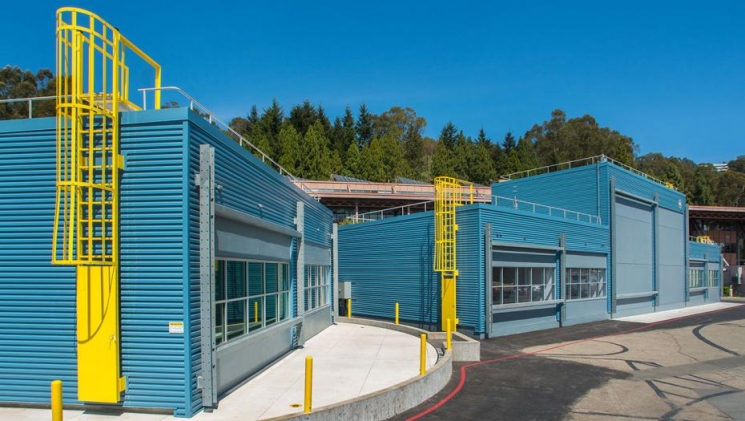zero-net-energy-small-commercial-retrofits
Zero-Net-Energy Small Commercial Retrofits
The Problem
The small commercial office market experiences many unique constraints to achieving substantial energy reductions, including: 1) a lack of awareness of and access to centralized, comprehensive, cost-evaluative information about how to achieve energy targets, and 2) affordable access to energy reduction services such as engineering and auditing services.
Energy efficiency tools and services currently involve high costs on a per-square-foot or kWh-saved basis. Small commercial offices in California consumed 3,500 GWh of electricity in 2012, and are projected to continue to grow.
Meeting the state's energy goals requires cost-effective whole-building integrated solutions that enable this sector to realize deep energy savings successfully and affordably.

Exterior of FLEXLAB®'s rotating bed
The Response
Berkeley Lab and Integral Group are developing cost-effective packages of pre-commercial and underutilized energy efficiency measures (EEMs) to inform a tool in the Commercial Building Energy Saver (CBES) online platform. This will enable small commercial building owners, contractors and other parties to evaluate cost-effective strategies for their building to achieve ZNE performance. In the last phase of the project, a sample ZNE package will be retrofit and demonstrated in a northern California site. The demonstration is targeted for 12 months of measurement and verification (M&V), as well as occupant engagement and an assessment of operational best practices to achieve and maintain ZNE operations.
EEMs
EEMs expected to be evaluated and pursued will include, but not be limited to the following.
- Envelope upgrades
- Optimized roof and wall insulation strategies that leverage thermal mass to enable peak load reductions while achieving comfort conditions
- Improved windows, including window films and electrochromics
- Daylight redirecting technologies such as prismatic glazing
- Building integrated photovoltaics
- Operable window options to support natural ventilation strategies
- Radiant barriers
- HVAC upgrades, low-energy approaches right-sized for lowered loads
- Radiant heating and cooling systems
- Underfloor air systems, including phase-change floor tiles
- Dedicated outside air systems and heat recovery ventilation
- Air to water heat pumps with heat recovery
- Low turn-down, low pressure-drop air-based systems
- Increased air movement to enable a wider comfort range
- Control system options for building management systems
- Peak shaving and time of use options for energy savings
- Automated demand response controls — including integration with PV system
- Lighting and daylighting upgrades
- Lighting controls, such as demand response
- Daylight strategies, including harvesting with daylight redirecting technologies
Expected Results and Their Benefits to California
The project will validate technical approaches to achieving ZNE performance in a notoriously impenetrable sector of real estate. The validation process will account for both the behavioral and technical results, tracking occupants' thermal and visual comfort and identifying best practices for operations.
Assuming a 5% adoption rate by 2030, specific benefits include:
- Lower Energy Use and Costs: $32M annually in electricity and natural gas cost savings.
- Greater Reliability: 118 MW peak load reduction. This power could participate in wholesale or retail DR programs at fast time scales, allowing further integration of grid scale alternatives.
- GHG Avoidance: Approximately 83,000 metric tons of emissions avoided.
Presentations:
Reports:
ZNE Retrofits for Small Commercial Offices - CBES Update Report
ZNE Package and Tubular Daylighting Device (TDD) FLEXLAB Test Results Report
Berkeley Mental Health Services Facility - Measurement and Verification Report
Berkeley Mental Health Services Facility - Zero Net Energy Best Practices Report
Partners:
Integral Group
San Francisco 2030 District (SF2030)
Sponsor:
California Energy Commission (CEC)
Links:
- FLEXLAB®: flexlab.lbl.gov
- Commercial Building Energy Saver (CBES): cbes.lbl.gov
